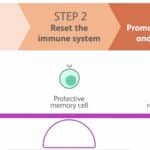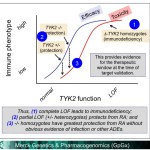
Disclaimer: I am a full-time employee of Bristol Myers Squibb.
When I practiced clinical rheumatology, I would often see patients with autoimmune conditions like systemic lupus erythematosus (SLE), systemic sclerosis (scleroderma), rheumatoid arthritis (RA), or myositis. A typical patient journey included an initial sense of relief when a diagnosis was established and a medicine was started. Inevitably, however, there was a sense of dread when a patient would ask: “When am I able to stop taking these strong immunosuppressive medicines?”
I would answer: “Likely never.”
That’s because, historically, there have been no cures for these diseases.
Now, however, I believe there may be an opportunity for new strategies that may deliver transformational outcomes for patients. In a new review paper published in Nature Reviews Drug Discovery (NRDD) (link here), our team at Bristol Myers Squibb (BMS), led by Dr. Francisco Ramírez-Valle, describes a “sequential immunotherapy” strategy that has the goal of achieving durable remissions and even functional cures. I presented an example of this strategy in action for SLE at the Stanford Drug Discovery Symposium. I also discussed the potential for functional cures during a recent BioCentury Show podcast and as part of NRDD’s “An Audience With” series.…
Read full article...

For me, the most enjoyable aspect of discovery research is exploring the unknown. It is about having a big idea; believing in that big idea based on a scientific belief framework; coming to a crossroads in the validity of the big idea, which is usually marked by deep uncertainty and skepticism; making a data-driven scientific decision to proceed (or not) to the next inflection point of testing the big idea; and ultimately arriving at a conclusion of whether the big idea is true.
Unfortunately, most of these scientific adventure stories are lost in the way we communicate about science. We tell a story to communicate the final message – we have a new medicine that is effective in treating patients – as that is the cleanest way to communicate to an audience not familiar with the gory details of the discovery. Such retrospective narratives are also the simplest way to communicate the validity of the big idea, not the tortuous and often complicated path to arrive at truth.
But such retrospective narratives don’t capture the immensely personal nature of our research discoveries. Moreover, such retrospective narratives often make the big idea seem preordained or obvious, when the big idea was anything but.…
Read full article...

[Disclaimer: I am an employee of Celgene. The views expressed here are my own.]
Human genetics offers the potential to identify drug targets and to inform decision-making on the journey to an approved drug. A recent study by Ference et al in the New England Journal of Medicine (NEJM) provides an example of human genetics in action. While most of the study focuses on Mendelian randomization to establish a relation among ACLY genetic variation, LDL cholesterol levels, and cardiovascular events, in this blog I focus on a topic highlighted in the companion NEJM editorial: human genetics to predict on-target adverse drug events (see NEJM editorial here).
First, what is the framework for the application of human genetics to predict on-target adverse drug events (ADEs)? Briefly, human genetics can predict on-target toxicity if the following criteria are met: (1) unambiguous association of genetic variant to a clinical phenotype that is a surrogate for drug efficacy and toxicity; (2) unambiguous relationship between disease-associated variant and implicated gene that is the target of the therapeutic intervention; (3) quantitative assessment of gene function and clinical phenotypes of efficacy and toxicity to estimate a “genotype-phenotype dose-response” relationship; and (4) confidence that the therapeutic intervention mimics the mechanism of action of the disease-associated variant.…
Read full article...

I admit upfront that this is a self-serving blog, as it promotes a manuscript for which I was directly involved. But I do think it represents a very nice example of the role of human genetics for drug discovery. The concept, which I have discussed before (including my last blog), is that there is a four-step process for progressing from a human genetic discovery to a new target for a drug screen. A slide deck describing these steps and applying them to the findings from the PLoS One manuscript can be found here, which I hope is valuable for those interested in the topic of genetics and drug discovery.
[Disclaimer: I am a Merck/MSD employee. The opinions I am expressing are my own and do not necessarily represent the position of my employer. However, the PLoS One study was performed while I was still in academics at BWH/Harvard/Broad.]
Before I provide a summary of the study, I would like to highlight a few recent news stories that highlight that the world thinks this type of information is valuable. First, the state of California is investing US $3-million in a precision medicine project that links genetics and medical records to develop new therapies and diagnostics (here, here).…
Read full article...





